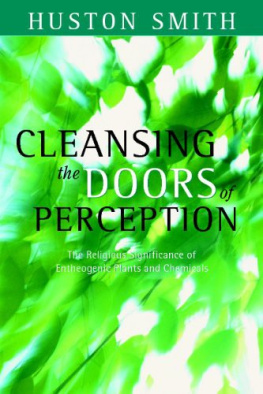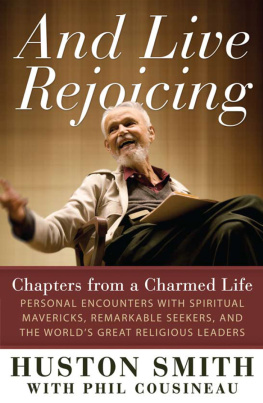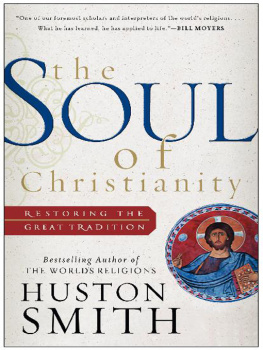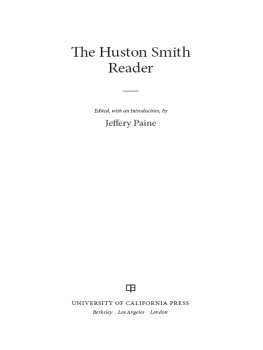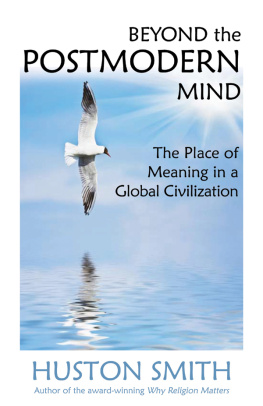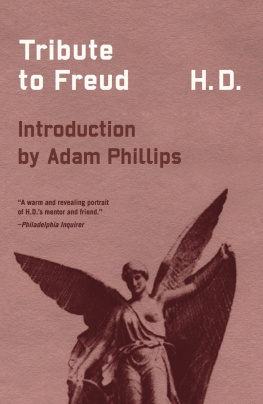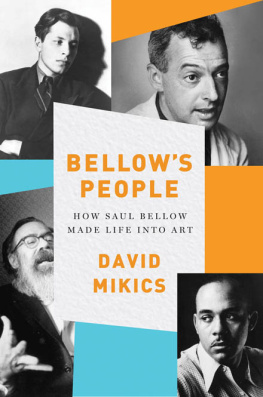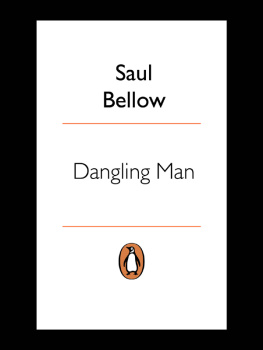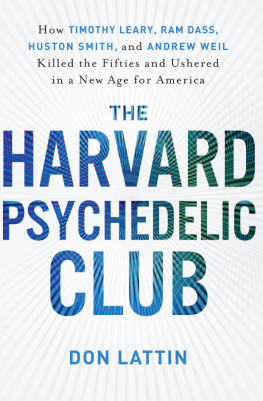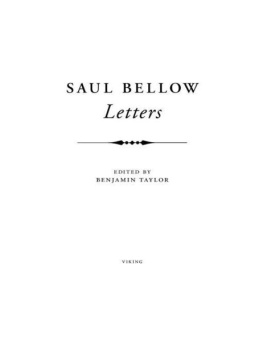CLEANSING
THE DOORS OF PERCEPTION
The Religious Significance of
Entheogenic Plants and Chemicals
HUSTON SMITH
JEREMY P. TARCHER/PUTNAM
a member of
Penguin Putnam Inc.
New York
Most Putnam books are available at special quantity discounts for bulk purchases for sales promotions, premiums, fund-raising, and educational needs. Special books or book excerpts also can be created to fit specific needs.
For details, write Putnam Special Markets, 375 Hudson Street, New York, NY 10014.
Jeremy R Tarcher Putnam
a member of Penguin
Putnam Inc.
175 Hudson Street
New York. NY 10014
www.penguinputnam.com
The substances discussed in this book are not without risks. Further, most of them are illegal under controlled-substance laws in the United States and elsewhere, even for religious use. Neither the publisher nor the author accepts liability for harms of any kind arising in connection with these substances.
Copyright 2000 by Huston Smith
All rights reserved. This book, or parts thereof, may not be reproduced in any form without permission.
Published simultaneously in Canada
Library of Congress Cataloging-in-Publication Data
Smith, Huston. [1919-2016]
Cleansing the doors of perception: the religious significance of entheogenic plants and chemicals/Huston Smith, p. cm.
ISBN 1-58542-034-4
1. Hallucinogenic drugs and religious experience. I. Title.
BL65.D7 S55 2000 99-087639
291.4'2dc21
CSP Entheogen Project Series, No. 5
This book also appears in a limited edition, ISBN 1-889725-03-X, published by the Council on Spiritual Practices www.csp.org
Printed in the United States of America
10 9
This book is printed on add-free paper.
Book design by Martino Mardersteig
To the memory of Walter Pahnke, and to his wife, Eva, and their children, Kristin, David, and Jonathan
The mescaline experience is without any question the most extraordinary and significant experience available to human beings this side of the Beatific Vision. To be shaken out of the ruts of ordinary perception, to be shown for a few timeless hours the outer and inner worlds, not as they appear to an animal obsessed with survival or to a human being obsessed with words and notions, but as they are apprehended, directly and unconditionally, by Mind at Large - this is an experience of inestimable value to any one.
Aldous Huxley
The spiritual crisis pervading all spheres of Western industrial society can be remedied only by a change in our world view. We shall have to shift from the materialistic, dualistic belief that people and their environment are separate, toward a new consciousness of an all-encompassing reality which embraces the experiencing ego, a reality in which people feel their oneness with animate nature and all of creation.
Everything that can contribute to such a fundamental alteration in our perception of reality must therefore command earnest attention. Foremost among such approaches are the various methods of meditation, which aim to deepen the consciousness of reality by way of a total mystical experience. Another important, but still controversial, path to the same goal is the use of the consciousness-altering properties of psychopharmaceuticals.
Albert Hofmann
Ecstasy! In common parlance ecstasy is fun. But ecstasy is not fun. Your very soul is seized and shaken until it tingles. After all, who will choose to feel undiluted awe ? The unknowing vulgar abuse the word; we must recapture its full and terrifying sense.
R. Gordon Wasson
Our normal waking consciousness ... is but one special type of consciousness, whilst all about it, parted from it by the filmiest of screens, there lie potential forms of consciousness entirely different. We may go through life without suspecting their existence; but apply the requisite stimulus, and at a touch they are there in all their completeness.... No account of the universe in its totality can be final which leaves these other forms of consciousness quite disregarded. How to regard them is the question,--for they are so discontinuous with ordinary consciousness. Yet they may determine attitudes though they cannot furnish formulas, and open a region though they fail to give a map. At any rate, they forbid a premature closing of our accounts with reality. Looking back on my own experiences [with nitrous oxide] they all converge toward a kind of insight to which I cannot help ascribing some metaphysical significance.
William James
The greatest of blessings come to us through madness, when it is sent as a gift of the gods. Heaven-sent madness is superior to man-made sanity.
Plato, in the Phaedrus
Preface
Introduction
Chapter Empirical Metaphysics
Chapter Do Drugs Have Religious Import?
Chapter Psychedelic Theophanies and the Religious Life
Chapter Historical Evidence: Indias Sacred Soma
Chapter 5 The Sacred Unconscious
Chapter Contemporary Evidence: Psychiatry and the Work of Stanislav Grof
Chapter The Good Friday Experiment
Chapter The Case of Cardinal John Henry Newman
Chapter 9Entheogenic Religions:
The Eleusinian Mysteries and the Native American Church
Chapter Something Like a Summing-Up
APPENDICES
Appendix A Secularization and the Sacred: The Contemporary Scene
Appendix B Thinking Allowed with Jeffrey Mishlove: A Televised Interview
Notes and References
I am indebted to the Council on Spiritual Practices www.csp.org for asking me to gather into a single volume the essays I have written on the entheogens. Without this request it would not have occurred to me to do that.
The Council has supported the project from beginning to end, and has my sincerest thanks.
Is it possible today, in the climate of fear created by the war on drugs, to write a book on the entheogens with the informed objectivity of Aldous Huxley's The Doors of Perception, the understanding that Albert Hofmann accorded the topic in LSD: My Problem Child, the expertise Gordon Wasson brought to it in his SOMA, and the open-mindedness with which William James approached the subject in The Varieties of Religions Experience ? And is the reading public ready for such a book?
I do not know the answers to those questions, but I find myself wanting to put them to the test. My reasons are theoretical rather than adversarial, for I am more philosopher than activist. It is true that, though this book is being published as a free-standing volume in its own right, it is also listed as number five in a series of books on the entheogens - virtually nonaddictive drugs that seem to harbor spiritual potentials - that the Council on Spiritual Practices is issuing. I am comfortable with this, for not only did that Council instigate this book by asking me to pull its essays together; I support its objectives, which include working cautiously toward carving out a space where serious students of the entheogens can pursue their interests carefully and lawfully. I was fortunate in being able to do that under the umbrella of Harvard University's 1960-63 research program before it careened off- course, and it is only fair to do what I can to accord others the same opportunity.
This said, however, I come back to my concerns here being philosophical rather than programmatic. During the semester that Aldous Huxley was at M.I.T., he remarked in the course of a seminar that nothing was more curious, and to his way of thinking more important, than the role that mind-altering plants and chemicals have played in human history. Add to that William Jamess point that no account of the universe in its totality can be taken as final if it ignores extraordinary experiences of the sort he himself encountered through the use of nitrous oxide. This entire book can be seen as an extended meditation on those two ideas.

